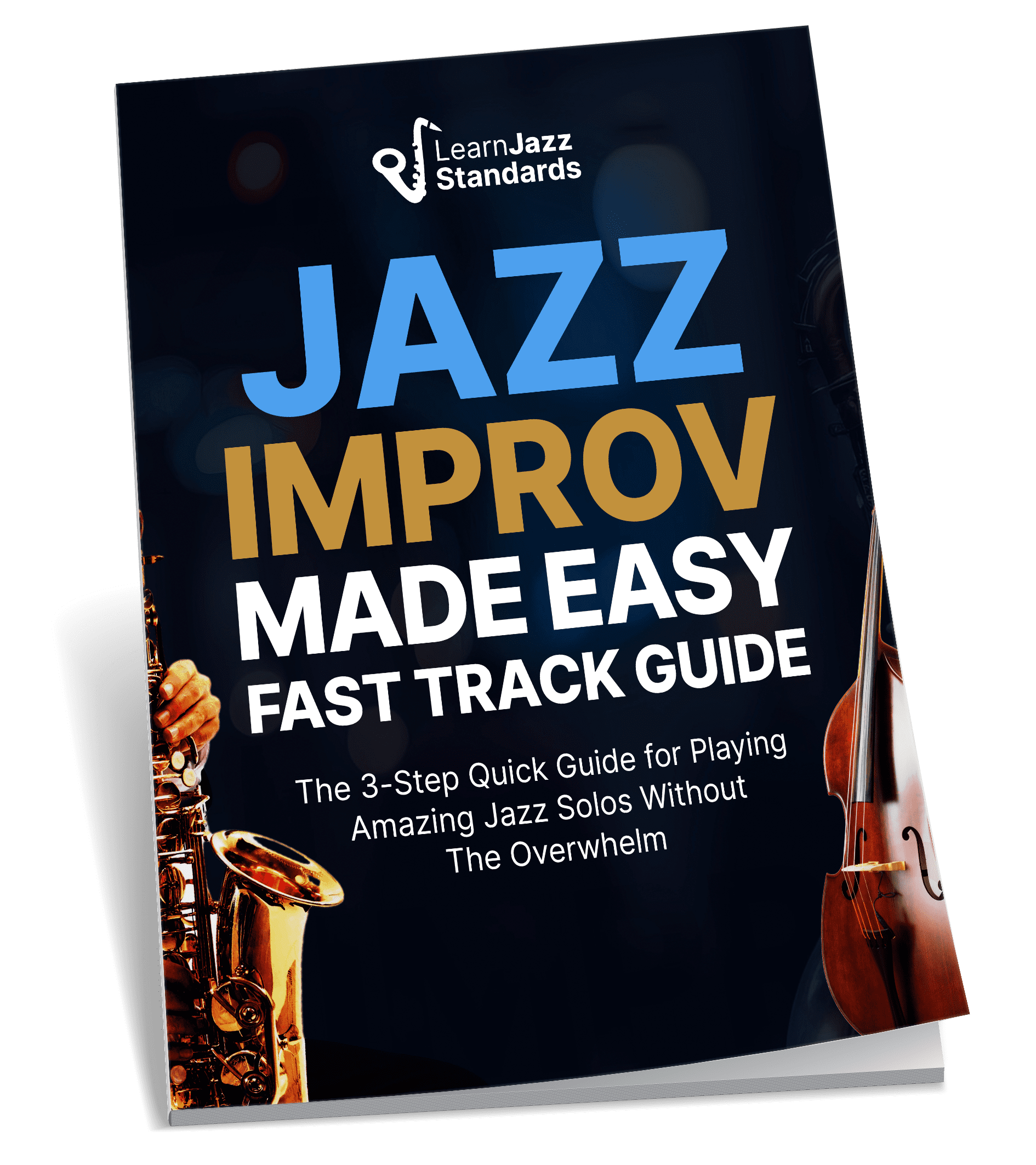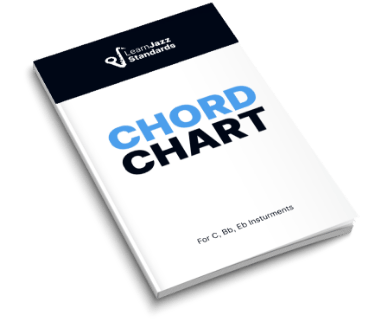If you are starting to study jazz, you might feel overwhelmed by all the different types of scales jazz musicians use when improvising.
While it’s true that there are quite a few jazz scales out there, each with its own distinctive sound, there are plenty of similarities and connections between them that make learning and memorizing them not so difficult when you take the right approach.
In this post, we will explore 16 common jazz scales and reveal important tips and tricks for learning and memorizing them. The more you learn in music theory, the easier it is to understand new concepts as you build on what you already know.
We will use the snowball effect to help you learn all the scales you’ll need to know to be a great jazz musician. We’ll cover the 16 most important jazz scales for jazz improvisation and how to use them, starting with—
- The Modes of the Major Scale
- The Diminished Scales
- Important Modes of the Melodic Minor (Jazz Minor) Scale
- Pentatonic and Blues Scales
- Bebop Scales
These scales are important tools, but without understanding how to use them, they are simply tools. Think of them like paints. An artist must use these paints to create something that becomes more than the sum of their parts.
Essentially, you still have to study the language and vocabulary of jazz to know how to apply these scales in your improvisation!
That’s exactly what the Learn Jazz Standards Inner Circle is all about.
When you join the Learn Jazz Standards Inner Circle, you join a community of jazz musicians who are passionate and dedicated to becoming better artists. You’ll gain access to—
- An abundance of useful courses taught by working jazz professionals that cover all the practice tips, strategies, and information you need to know to become a better jazz musician.
- Instrument Accelerator courses for trumpet, saxophone, bass, guitar, and piano to help you master the technical aspects of your instrument.
- A monthly deep-dive into a jazz standard, including melodic and harmonic analysis, memorization tips, and tools for improvisation.
See what the Inner Circle is all about. Now, let’s learn some jazz scales!
Table of Contents
The Modes of the Major Scale
In diatonic harmony, understanding the modes is incredibly important for relating “pitch collections” to different chord qualities. If you know the modes of the major scale, you can better understand the internal structure of major keys.
Knowledge of the major scale modes and how they work is a prerequisite for navigating jazz harmonies, which often move through several keys rapidly. Also, memorizing the modes of the major scale will help you tackle non-diatonic scales often used in jazz improvisation, such as the melodic minor scale (jazz minor scale), harmonic minor scale, or other jazz scales.
That’s why starting at the major scale modes is essential when learning jazz theory.
The basic principle behind modes is that you can start at any note in a scale and count that as the 1st note. This works because scales are repetitive sequences, and the modes of scales are made of all the same notes. In essence, all the modes of the major scale are the same scale in terms of the note sequence.
The C Ionian scale is made of the same notes as the D Dorian scale, which has the same sequence of notes as the E Phrygian scale, and so on. This principle is true for other scales, like harmonic minor scales or melodic minor scales.
1. Ionian or Major scale
- Formula: 1-2-3-4-5-6-7-8
- Works well over the tonic chord or C major chord

The major scale, also called the Ionian mode, is consonant over major chords. For example, a C major scale works over with the tonic major chord or Cmaj7.
2. Dorian Minor scale
- Formula: 1-2-b3-4-5-6-b7-8
- Works well over Dmin7 or any other minor chords that don’t have a major 7th or altered 5th

The Dorian minor scale has a b3, natural 6, and b7. It is the most commonly used minor scale for improvisation in jazz music.
It works over any ii chord, or i chord, but it can also be used for other minor chords, such as the iii and vi.
3. Phrygian Minor scale
- Formula: 1-b2-b3-4-5-b6-b7-8
- Works well over the ii chord (Emin7) or over V7(b9)sus chords

Of the five types of minor scales (Dorian, Phrygian, Aeolian or Natural Minor, Harmonic Minor, and Melodic Minor), the Phrygian mode is arguably one of the two least common minor scales for jazz improvisation, along with the harmonic minor scale.
Check out our blog post on using the harmonic minor scale in improvisation.
The Phrygian mode is still used in at least two contexts:
- The Phrygian scale works over a iii chord (Emin7 in the key of C works with E Phrygian)
- The Phrygian minor can also be used over a dominant chord if the dominant chord is suspended and has a b9. For instance, in a G7(b9)sus to Cmin7 progression, a G Phrygian (same key center as Eb major) works well.
4. Lydian Major (Lydian Scale)
- Formula: 1-2-3-#4-5-6-7-8
- Works well over both major chords with a major 7th interval (Imaj7 and IVmaj7)

The Lydian Mode works well over major chords, like maj7#4, maj7b5, or maj7#11 chord.
The most obvious example is a IV chord (e.g., F major in the key of C), but the Lydian mode can also work well over a I chord.
The Lydian scale is the brightest of all the church modes and has a distinct, modern flavor over a I chord due to the non-diatonic (in the context of a I chord) #4 chord tone.
5. Mixolydian Scale (Dominant Scale)
- Formula: 1-2-3-4-5-6-b7-8
- Works well over V7 chords

The Mixolydian scale (or dominant scale) is the most basic scale for improvising over dominant chords.
However, you can use many other jazz scales over dominant chords to hit all the alterations. Here are a few besides the dominant scale—
- Altered scale
- The Lydian dominant scale
- Half-whole diminished scale
- Whole-tone
- Phrygian
6. Aeolian or Natural Minor Scale
- Formula: 1-2-b3-4-5-b6-b7-8
- Works well over minor 7 chords

When playing in a minor key, the Aeolian or natural minor is the tonic scale. Because of its relationship to the minor key, you’d think the natural minor scale would be the preferred jazz scale for minor chords. However, most players default to using Dorian over a minor chord (even the tonic chord in a minor key).
This is due to the relative consonance of the natural 6 from the Dorian jazz scale versus the relative dissonance of the b6 from the Natural minor jazz scale.
You can choose to use Dorian over a vi chord, although Natural Minor is usually an acceptable choice also for a vi chord or a minor i chord.
7. Locrian or Half Diminished
- Formula: 1-b2-b3-4-b5-b6-b7-8
- Works well over min7b5 chords

The final scale of all the major modes, the exotic Locrian scale, is the darkest, most dissonant mode of the major scale. It works well over a half-diminished chord (a min7(b5) chord).
When approaching half-diminished chords, some players like to sharpen the b2 from the Locrian mode to a natural 2.
If you raise the b2 to a natural 2, this new scale is called the “Locrian #2” (that’s “sharp” 2, not “number” 2) mode, which is the 6th mode of the melodic minor scale. This mode of melodic minor is built with the following formula: 1-2-b3-4-b5-b6-b7-8.
Note it is the natural 2 that makes this scale different from the Locrian mode.
If you’d like a full explanation of the major modes, check out this video I’ve created:
The Diminished Scales
Let’s take a break from major scales and dig into some juicier jazz scales.
The diminished scale is an eight-note scale that only has two modes. This is because the diminished scale is a symmetrical scale. To memorize the diminished scale shapes, you only need to learn two scales—the dominant diminished scale and the whole-half diminished scale.
All diminished scales are made up of alternating half-steps and whole-steps, but you can start with either a half-step or a whole-step.
- If you start on a half step, you have the dominant diminished
- If you start on a whole step, you have the whole-half diminished
These scale shapes are easier to visualize (and therefore remember), especially on the guitar fretboard or piano.
8. Half-Whole Diminished or Dominant Diminished
- Formula: 1-b2-b3-3-#4-5-6-b7-8
- Works well over V713b9 chords

The half-whole diminished scale is also called the dominant diminished scale because it works well over dominant chords like the dominant 13(b9) chord.
The half-whole diminished scale is made up of the intervals H-W-H-W-H-W-H-W (H=half-step, W=whole-step).
9. Whole-Half Diminished
- Formula: 1-2-b3-4-#4-#5-6-7-8
- Works well over diminished seventh chords

If you start a diminished scale with a whole step, it becomes W-H-W-H-W-H-W-H. This mode of the diminished scale works well over diminished chords
Be sure to check out our diminished chord workout.
Other Essential Jazz Scales
10. Altered Scale
- Formula: 1-b2-b3-3-#4-b6-b7-8
- Works well over a V7#9b13) or V7alt, V7(#9b13) or V7alt

The altered scale is the 7th mode of the melodic minor scale.
This mode of melodic minor works great over an altered chord (7#9b13, or 7alt), which implies 7(b9#9#11b13). This scale has many names, including “Super-Locrian,” “Diminished-Whole-Tone,” or even the “Dim-Wit” scale.
Vibraphonist Gary Burton reminds us that the altered scale has a hidden tone, the natural 5th, that is also consonant with this scale.
Though the natural 5th isn’t technically in the 7th mode of the melodic minor scale, remember that the natural 5th works when improvising with an altered scale over an altered dominant chord.
11. Whole-Tone Scale
- Formula: 1-2-3-#4-b6-b7-8
- Works well over V7b13 chords

Ah, the dream sequence/flashback scale. I remember…
The whole-tone scale only has six notes (the 7th note would be the doubled root in the top octave). It is entirely made up of whole steps: W-W-W-W-W-W , and is another symmetrical scale.
The whole tone scale has a very undefined sound, which makes it one of the more interesting but difficult-to-use jazz scales. This scale implies a natural 9, a #11, a b13, and a b7.
It works well over a 7b13 chord as long as there is a NATURAL 9, not a b9 or #9.
12. Minor Pentatonic and Blues Scales
Formula: 1-b3-4-b5-5-b7-8 (for Blues Scale add #4)
Minor Pentatonic:

Blues Scale:

The blues scale is one of the first scales that many jazz musicians are taught. I prefer to think of the blues scale as a minor Pentatonic with an added #4.
These scales are often played over a blues because of the chromaticism between the 4th and the 5th scale degrees. If you are ready to go beyond these basic blues scales, sign up for our free masterclass, “Boost Your Jazz Blues.“
13. Lydian Dominant
- Formula: 1-2-3-#4-5-6-b7-8
- Works well over V7#11 chords

The Lydian dominant scale is another mode of the melodic minor scale and works well over dominant chords with a #11.
Lydian implies a #4. Dominant implies a b7. If you put them together, you have the Lydian dominant scale sound, which works well over jazz chord progressions with a dominant 2 chord, like the Bb7 in Donna Lee or the F7 in There Will Never Be Another You.
This scale also works well over a dominant IV7 chord, a bII7 tritone sub, or any 13(#11) chord.
Bebop Scales (Essential For Jazz Vocabulary)
If you add an extra chromatic passing tone to the major scale, the Dorian scale, or the Mixolydian scale, you get a bebop scale. These jazz scales are essential for understanding jazz vocabulary.
While bebop musicians technically put the chromatic notes in other places, which sounded fine in recordings, jazz theorists have codified the bebop scales into something more concrete.
By placing a chromatic passing tone either between 6th and 5th scale degrees (in the case of major bebop scales) or between the 8th and b7th scale degrees (in the case of the dominant bebop scale or the minor bebop scale), jazz musicians can keep chord tones on the downbeats while still playing 8th-note lines.
The bebop scales are primarily descending scales, so I’ve listed the numbers backward to reflect the descending nature of these scales.
14. Major Bebop
- Formula: 8-7-6-b6-5-4-3-2-1
- Works over maj7 chords

You can use the major bebop scale with any major chord.
The chromatic passing tone is placed between the 6th and 5th scale degrees. With any of these bebop scales, the idea is to use the chromatic note as a chromatic passing tone and not to stop on the chromatic note for too long.
15. Minor Bebop Scales
- Formula: 8-7-b7-6-5-4-b3-2-1
- Works Well over min7 chords
Formula: 8-7-b7-6-5-4-b3-2-1 (Cmin7)

The minor bebop scale has a passing tone between the 8th and b7th. It works well over a minor chord.
Remember never to put the chromatic passing tone on downbeats when playing the minor bebop scale!
16. Dominant Bebop Scale
- Formula: 8-7-b7-6-5-4-3-2-1
- Works well over unaltered Dominant chords (V9 chords are ok)

The dominant bebop scale is the quintessential bebop scale. It has a chromatic passing tone between the 8th and b7th scale degrees, and it works best over dominant chords (ensure they are unaltered ones).
Take your Jazz Scales To The Next Level By Joining the Learn Jazz Standards Inner Circle
Trying to improve your jazz guitar playing by flying through chord scale guitar solos like Joe Pass? Are you trying to blast through the whole tone scale on the saxophone like Wayne Shorter? Do you want to rip through melodic minor scales on the piano like Chick Corea?
All these goals are possible, but you need to develop your jazz scale fundamentals first.
Practicing scales is one of the most important things to get right when studying jazz. The problem is that most musicians never actually learn how to practice correctly. If you want to supercharge your practicing skills and master jazz scales on your instrument, then you need to check out the Inner Circle. You’ll get—
- Instrument-specific training from professional jazz musicians through our Instrument Accelerator Courses
- Detailed and personalized jazz practice plans to make sure you make the most of your practice time
- A new monthly jazz standard to learn through expert analysis and improvisational advice
- Plus, you’ll join a community of like-minded musicians who love jazz just as much as you do
Ready to accelerate your jazz improvisation skills? Check out our Inner Circle today.











